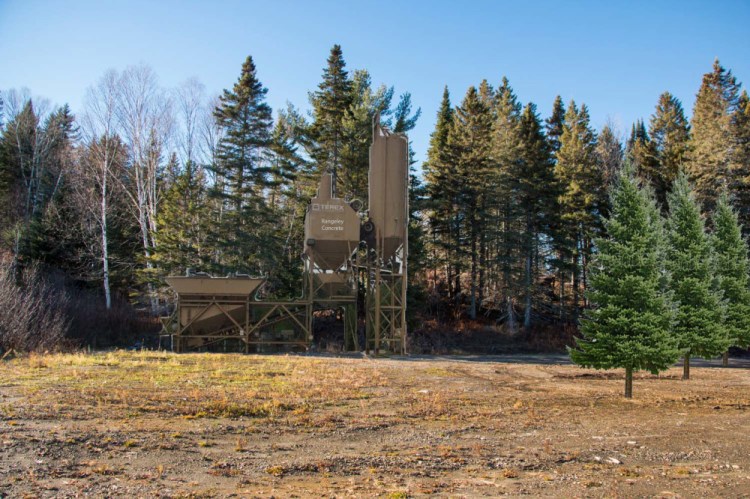RANGELEY — The Rangeley Planning Board upheld on Wednesday its previous decision to allow a controversial concrete batch plant in the town’s Cemetery Hill commercial subdivision.
In May the board agreed to reconsider the plant’s permit after requests from residents and abutters who oppose the plant’s construction.
Board members visited the plant site Wednesday off Route 4 as well as surrounding areas to gauge the extent to which the plant is visible from the town’s National Scenic Byway, one of the concerns lodged by the plant’s opponents.
After the site visit, the board convened for more than three before voting 3-1 to issue a new permit in the seventh hearing on the plant since partners in M&H Construction first applied for a permit in October.
M&H agreed to additional conditions for the new permit, including a screen of trees on two sides of the plant to “conceal the batch plant from view from the highway and decrease noise,” according to the board’s findings and conclusions. M&H also agreed to keep all activity on the site, including deliveries and maintenance, within its 7 a.m. to 5 p.m., six days a week operating hours; apply calcium chloride to minimize dust kicked up; and properly maintain plant and baghouse filters.
Kenneth Haley, general manager of M&H, expressed relief about the board’s ruling in an interview Thursday.
“Well, it went way better than we thought,” Haley said. “We got another approval. They did what was right.”
Haley praised Planning Board member Rebekah Carmichael, who led Wednesday’s meeting, saying Carmichael was thorough and attentive, letting every constituent speak before working with the board on its ruling.
Haley said his company’s concrete batch plant was now assembled but not yet operational. He said he hoped to have the plant running in the next month despite the legal complaint opponents already have filed in Franklin County Superior Court and the potential for additional appeals through the Planning Board and the Zoning Board of Appeals.
Judith Morton, one of the abutters opposing the plant, said she planned to continue working to have the plant removed.
“I can’t (drop the case). We just can’t,” Morton said. “It’s not only what is good for me personally, but what is good for the town.”
At issue for Morton is the plant’s potential effect not only on the value of her home, which she has described as her primary retirement asset, but also on the town’s business development and tourism efforts moving forward.
“What our town is based on is its natural and scenic beauty and its peace and solitude and its quietness,” Morton said. “It’s what differentiates us from many other communities in this state and what makes us special, and this is a blight on that.”
In terms of next steps, Morton’s attorney, David Lourie, said the legal case is pending in Superior Court, where plant opponents are waiting to hear whether the court will take up the case or require them first to work through the town’s appeals process.
Plant opponents now might ask the Planning Board to reconsider its latest decision. If the board refuses to revisit the issue, opponents then can appeal to the Zoning Board of Appeals.
“My client is committed to taking this out to its final conclusion, and we have no doubt that in the end, common sense, if not justice, will prevail,” Lourie said.
Kate McCormick — 861-9218
kmccormick@centralmaine.com
Twitter: @KateRMcCormick
Send questions/comments to the editors.




Comments are no longer available on this story